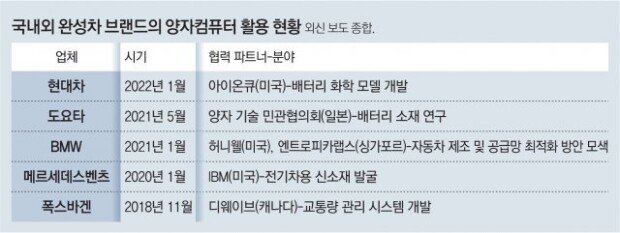Hyundai Motor to develop next-gen battery with quantum computer
Hyundai Motor to develop next-gen battery with quantum computer
Posted January. 21, 2022 07:41,
Updated January. 21, 2022 07:41

Hyundai Motor Company announced on Thursday that it would cooperate with U.S.-based quantum computing company IonQ to develop next-generation batteries with better efficiency and stability.
Quantum computers have computing speed several million times faster than the highest performing supercomputers available now. They can perform a quantum simulation to calculate complex molecular structures and chemical reactions. It garners attention as a core technology of the future to resolve unsolved issues in battery materials, new drug development, and aerospace. Overseas auto manufacturers, including Germany’s Mercedes-Benz and BMW and Japan’s Toyota, partnered with quantum computing companies to develop batteries with higher efficiency and improve the manufacturing process.
IonQ, which was selected as a partner of Hyundai Motor Company, was founded in 2015 by Professor of Duke University Kim Jung Sang and Professor of University of Maryland Christopher Monroe, both known as erudite scholars in quantum computing. The company is known for having developed quantum computers that work at room temperature, rather than extremely low temperature. It was also listed on the New York Stock Exchange in October last year for the first time as a pure quantum computer developer. Through the partnership, the South Korean auto manufacturer aims to develop a battery chemistry model to simulate the structure and energy of lithium oxides. The model is expected to contribute to improving the performance and stability of lithium batteries and reducing their costs.
As electrification becomes the mainstream, more auto manufacturers are adopting quantum computing technologies. In November 2018, Germany’s Volkswagen partnered with D-Wave Systems in Canada and announced transport optimization technology using quantum computing. The technology collects the number of cars nearby and their speed in real-time and finds an optimal route. Mercedes-Benz and Toyota are collaborating with IBM and the Japanese public-private council, respectively, to explore new battery materials.
It is believed that Hyundai Motor Company is following suit after shifting the focus of its R&D organization from internal combustion engine to electrification. “We will look for opportunities to dominate the next-gen battery market with quantum computing,” said Im Tae-won, the director of Hyundai Motor Company's Institute of Fundamental & Advanced Technology and the head of hydrogen fuel cell business unit.
Jae-Hyeng Kim monami@donga.com







